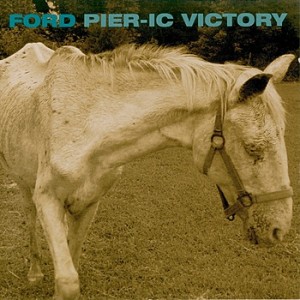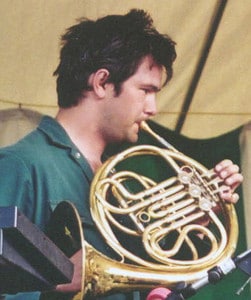“honor the shadows that speak for the light”
Artist: Ford Pier
Album: Pier-ic Victory
Ford Pier‘s albums have largely consisted of guitar-centered alternative rock, with strong senses of both dynamics and groove, but that’s not where I want to start this review. My all-time favorite male singers, judged as singers on studio albums, would rank something like
I considered other candidates for third (Serj Tankian? David Byrne starting mid-to-late 1980s? Michael Stipe starting early 1990s? Scott Miller once he fronted the Loud Family and no longer sounded like a 12-year-old?), but Ford Pier feels to me like the right answer, and the context should  establish a couple things. The first, obviously, is that I like pretty, clear-toned voices that can carry a big melody. I have friends who prefer the voices of Bob Dylan and Lou Reed and Tom Waits, drawled and droning and gravelly, but for me those voices are an obstacle.The second, less obvious, is that I love best singers who *communicate*: singers who in fact have multiple voices, fit to each occasion, and are excellent at enunciating their words in ways that make me pay attention. (Which indeed is why I sometimes enjoy Tom Waits despite the driveways full of gravel he swallows before each song.) I do read lyric sheets if they’re available, but left to its own devices, my brain tends to process singing as pure sound. Too many times I’ve heard some song that’s been getting radio play for decades, one I’ve liked all along, and suddenly realized “Hey wait, this song is about something! Did you guys know that?” Yes, you guys knew that. Lorde’s recent #1 hit Royals is almost entirely vocals and scant synthesizer, and it’s very pretty indeed, yet I wouldn’t have a clue it was about social class and the seductiveness of brand names if I hadn’t been convinced to look the words up. Lorde, thus, is not one of my favorite singers: sure it’s possible to hear her words, but she willingly lets a listener just zone out to the sounds she’s making. So my brain does that, and I miss out.
establish a couple things. The first, obviously, is that I like pretty, clear-toned voices that can carry a big melody. I have friends who prefer the voices of Bob Dylan and Lou Reed and Tom Waits, drawled and droning and gravelly, but for me those voices are an obstacle.The second, less obvious, is that I love best singers who *communicate*: singers who in fact have multiple voices, fit to each occasion, and are excellent at enunciating their words in ways that make me pay attention. (Which indeed is why I sometimes enjoy Tom Waits despite the driveways full of gravel he swallows before each song.) I do read lyric sheets if they’re available, but left to its own devices, my brain tends to process singing as pure sound. Too many times I’ve heard some song that’s been getting radio play for decades, one I’ve liked all along, and suddenly realized “Hey wait, this song is about something! Did you guys know that?” Yes, you guys knew that. Lorde’s recent #1 hit Royals is almost entirely vocals and scant synthesizer, and it’s very pretty indeed, yet I wouldn’t have a clue it was about social class and the seductiveness of brand names if I hadn’t been convinced to look the words up. Lorde, thus, is not one of my favorite singers: sure it’s possible to hear her words, but she willingly lets a listener just zone out to the sounds she’s making. So my brain does that, and I miss out.
Communication of words and emotions is Ford Pier‘s forte, as a singer. He is, while very pure of tone, dorkier-sounding than Mercury or Bono, and he stretches harder to complete (successfully) his ambitious melodies, at times gliding up to the correct note having aimed just a bit low. But he deploys more versions of his voice with more skill than any other man I can name. Let’s use his 2005 masterpiece Pier-ic Victory (a “Pyrrhic Victory” is one attained at such cost that it almost destroys the victor) for our example. He starts out with civic-pride solemnity on Legionnaire’s Song, deploying it for the lower classes as a threat and a weapon (“We built our city from/ your unburied bones and hair/ and we gazed into the void/ and we saw your future there./ And why should it be otherwise?/ We were the ones abandoned./ While you contrived your perfect life/ we built an army”). Scarlet Thread sees his voice frail and almost holy at first as he pursues the thought (“There will be no clemency. Mercy for none. I’m almost done, and already I’m as lonely as I will be when I lay waste to the world”), then turns raspy, then firm, as he imagines the triumph-to-be, before returning to the frail and vulnerable offer of “Tie this thread to your window when you go to bed/ and I’ll spare you when I lay waste to the world”.
For Charmed, I’m Sure and Diaphonous Hairshirt he’s strutting and aggressively snarky, a rock star of glamorous nerdhood. Estrus has him in character and convincingly unhinged, hungry for infinite power and [what the character perceives as the same thing] the safety of his children. On I Don’t Know Nothin’ about Nothing he’s just as urgent, but helpless, frantic to understand a too-complicated world; his fast pedantic outburst of speech (“Nothing is something, because if nothing were nothing we’d know nothing about nothing, because you can’t know something about nothing is something because nothing *isn’t* something. Fool’s paradise! Fool’s paradigm! Fool’s paradox! A waste of time!”) was the first bit of the album to lodge in my head for ready replay. The second bit was his singing on Horrible, the lines where questioning and confusion suddenly resolve at the end into blunt, disgusted condemnation: “I learned when I was young, it was wrong to point and stare/ I also learned at the same time, sometimes life just isn’t fair/ And I also learned that ‘Live and let live’ means one of two things: You just don’t know, or you don’t care”.
On the other hand, if the album had had a hit, it most likely would have been the gorgeous yearning for meaning that is Why on Earth? He is as autobiographical and self-lacerating on the gruffly spoken Confession is Good for a Laugh as any comedian. And if his anthemic leading-the-charge  on All Fall Together can’t pull off the angelic grace of Bono’s One or Mercury’s One Vision/ We Will Rock You bravado, it’s still got plenty of force, and maybe just the right amount of tremor, for a pep talk like “All fall together: the leap or the shove?/ From a great golden firmament, into debt, into love/ into a mire of deceit, a fall from grace/ through trouble and sparks into empty space./ The restoration that awaits us all/ would not cleanse or redeem if it weren’t for the fall”.
on All Fall Together can’t pull off the angelic grace of Bono’s One or Mercury’s One Vision/ We Will Rock You bravado, it’s still got plenty of force, and maybe just the right amount of tremor, for a pep talk like “All fall together: the leap or the shove?/ From a great golden firmament, into debt, into love/ into a mire of deceit, a fall from grace/ through trouble and sparks into empty space./ The restoration that awaits us all/ would not cleanse or redeem if it weren’t for the fall”.
The music on Pier-ic Victory is also excellent, very much the vocals’ partner in the setting of mood. Of all his albums, it’s the least expressive of his background as guitarist for Canadian hardcore punk bands D.O.A. Most of his albums contain several songs (usually much better than they have any right being) where his lyrical/ melodic twists and turns take place over evolving repetitions of a single repeated guitar riff; excepting the excellent Confession is Good for a Laugh, all the arrangements on Pier-ic Victory are more developed, and the drumming is outstanding throughout. It’s still mostly guitar-based, after the church organ of Legionnaire Song (and ignoring the wonderful rapid-fire xylophone of I Don’t Know Nothin’ about Nothing). But Charmed, I’m Sure and Caesar’s Wife insert rhythmic stutters, tricky latticeworks of drums, and bits of gloriously cheesy chorus pedal into an early Cheap Trick swagger. Diaphonous Hairshirt is jangly country-rock set to cartoon-factory noises that remind me of Talking Heads’ Facts of Life; Estrus takes turns being three different hardcore punk songs, with exaggeratedly un-smooth transitions.
Horrible begins and ends in single-evolving-riff mode, but detours into a spectacular guitar/ machine-whacking duet, then into spoken word/ spooky singing with vocal treatments and train percussion. Why on Earth?‘s guitar plays like Gonzo the Great rendering R.E.M.’s Everybody Hurts alone in the desert. As for the Unseen World and All Fall Together, they take what seem like standard verse-chorus-bridge constructions and steadily build their power into 6-minute juggernauts.
Pier-ic Victory is my 2nd-favorite album of the 21st century so far (behind Amy X Neuburg‘s Residue). Now, I’m clear about my biases with Ford Pier. His singing is perfect for my tastes for my reasons. This album was produced by Michael Philip Wojewoda, who also produced several of my all-time favorite albums for the Rheostatics. Some of Pier’s lyrical themes — class resentments, the eager but frustrating desire to know and understand everything in the universe, a rueful and affectionate disgust at the idiocies of his younger self, an awareness that he probably isn’t as different now as he’d hope to be — speak to me in ways that they might not to you. On the other hand, before this belated attempt to write about him for an audience, I’ve managed to sell at least three friends on him directly. Because this *is* my 2nd-favorite album of our young century, against several hundred other albums I like very very much. So there’s lots of room for you to be less enraptured than I am … while still being plenty pleased.
– Brian Block
